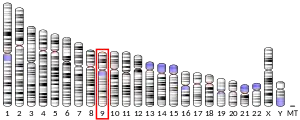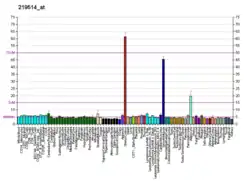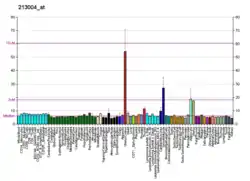Angiopoietin-related protein 2
Angiopoietin-related protein 2 also known as angiopoietin-like protein 2 is a protein that in humans is encoded by the ANGPTL2 gene.[5][6]
| ANGPTL2 | |||||||||||||||||||||||||||||||||||||||||||||||||||
|---|---|---|---|---|---|---|---|---|---|---|---|---|---|---|---|---|---|---|---|---|---|---|---|---|---|---|---|---|---|---|---|---|---|---|---|---|---|---|---|---|---|---|---|---|---|---|---|---|---|---|---|
| Identifiers | |||||||||||||||||||||||||||||||||||||||||||||||||||
| Aliases | ANGPTL2, ARP2, HARP, angiopoietin like 2 | ||||||||||||||||||||||||||||||||||||||||||||||||||
| External IDs | OMIM: 605001 MGI: 1347002 HomoloGene: 22695 GeneCards: ANGPTL2 | ||||||||||||||||||||||||||||||||||||||||||||||||||
| |||||||||||||||||||||||||||||||||||||||||||||||||||
| |||||||||||||||||||||||||||||||||||||||||||||||||||
| |||||||||||||||||||||||||||||||||||||||||||||||||||
| |||||||||||||||||||||||||||||||||||||||||||||||||||
| |||||||||||||||||||||||||||||||||||||||||||||||||||
| Wikidata | |||||||||||||||||||||||||||||||||||||||||||||||||||
| |||||||||||||||||||||||||||||||||||||||||||||||||||
Function
Angiopoietin-like protein 2 maintains tissue homeostasis by promoting adaptive inflammation and subsequent tissue reconstruction, whereas an excess of ANGPTL2 activation induced by prolonged stress promotes the breakdown of tissue homeostasis due to chronic inflammation, promoting the development of metabolic diseases. ANGPTL2 has a role also in angiogenesis, in tissue repair, in obesity, in atherosclerotic diseases and finally in carcinogenesis.[7]
Angiopoietins are members of the vascular endothelial growth factor family and the only known growth factors largely specific for the vascular endothelium. Angiopoietin-1, angiopoietin-2, and angiopoietin-4 participate in the formation of blood vessels. ANGPTL2 protein is a secreted glycoprotein with homology to the angiopoietins and may exert a function on endothelial cells through autocrine or paracrine action.[6]
References
- GRCh38: Ensembl release 89: ENSG00000136859 - Ensembl, May 2017
- GRCm38: Ensembl release 89: ENSMUSG00000004105 - Ensembl, May 2017
- "Human PubMed Reference:". National Center for Biotechnology Information, U.S. National Library of Medicine.
- "Mouse PubMed Reference:". National Center for Biotechnology Information, U.S. National Library of Medicine.
- Kim I, Moon SO, Koh KN, Kim H, Uhm CS, Kwak HJ, Kim NG, Koh GY (Oct 1999). "Molecular cloning, expression, and characterization of angiopoietin-related protein. angiopoietin-related protein induces endothelial cell sprouting". J Biol Chem. 274 (37): 26523–8. doi:10.1074/jbc.274.37.26523. PMID 10473614.
- "Entrez Gene: ANGPTL2 angiopoietin-like 2".
- Kadomatsu, Tsuyoshi; Endo, Motoyoshi; Miyata, Keishi; Oike, Yuichi (May 2014). "Diverse roles of ANGPTL2 in physiology and pathophysiology". Trends in Endocrinology & Metabolism. 25 (5): 245–254. doi:10.1016/j.tem.2014.03.012. PMID 24746520.
External links
- Human ANGPTL2 genome location and ANGPTL2 gene details page in the UCSC Genome Browser.
Further reading
- Andersson B, Wentland MA, Ricafrente JY, et al. (1996). "A "double adaptor" method for improved shotgun library construction". Anal. Biochem. 236 (1): 107–13. doi:10.1006/abio.1996.0138. PMID 8619474.
- Zeng L, Dai J, Ying K, et al. (2003). "Identification of a novel human angiopoietin-like gene expressed mainly in heart". J. Hum. Genet. 48 (3): 159–62. doi:10.1007/s100380300025. PMID 12624729.
- Humphray SJ, Oliver K, Hunt AR, et al. (2004). "DNA sequence and analysis of human chromosome 9". Nature. 429 (6990): 369–74. Bibcode:2004Natur.429..369H. doi:10.1038/nature02465. PMC 2734081. PMID 15164053.
- Sun H, Zheng JM, Chen S, et al. (2007). "Enhanced expression of ANGPTL2 in the microvascular lesions of diabetic glomerulopathy". Nephron Exp. Nephrol. 105 (4): e117–23. doi:10.1159/000100493. PMID 17347581. S2CID 30326676.






